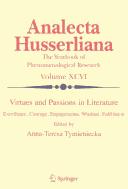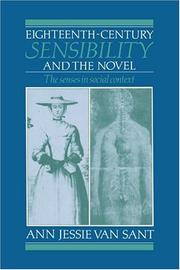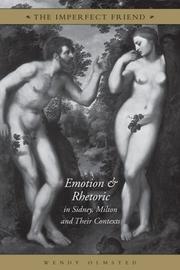| Listing 1 - 7 of 7 |
Sort by
|

ISBN: 9781402064210 1402064217 Year: 2008 Volume: 96 Publisher: Dordrecht ; [London] : Springer,
Abstract | Keywords | Export | Availability | Bookmark
 Loading...
Loading...Choose an application
- Reference Manager
- EndNote
- RefWorks (Direct export to RefWorks)
Creation (Literary, artistic, etc.) --- Emotions in literature. --- Literature --- Virtue epistemology. --- Virtues in literature. --- Psychological aspects. --- Philosophy.
Book
ISBN: 9401205795 1435641116 9781435641112 9789401205795 9042023929 9789042023925 9042023929 9789042023925 Year: 2008 Publisher: Amsterdam New York, NY Rodopi
Abstract | Keywords | Export | Availability | Bookmark
 Loading...
Loading...Choose an application
- Reference Manager
- EndNote
- RefWorks (Direct export to RefWorks)
Joys and Sorrows of Imaginary Persons is a literary approach to consciousness where Donald Wesling denies that emotion is the scandal or handmaid of reason—rather emotion is the co-creator with reason of human life in the world. Discoveries in neuro-science in the 1990's Decade of the Brain have proven that thinking and feeling are wrapped with each other, and regulate and fulfill each other. Accepting this co-creative equality, we reveal a new role for literature, or a traditional role we’ve repressed: literature as a set of processes in time where we’ve thought feeling through stories about the lives of imaginary persons. We need these stories in order to practice emotions for when we return to the world from reading. Donald Wesling argues that to be more accurate in our dealings with stories, we require a grammar of this new recognition, where we build up traditional stylistics by a more careful tracking of emotion-states as these are set into writing. The first half of Joys and Sorrows of Imaginary Persons offers a creative stock-taking of the current state of scholarship on emotion, based on wide reading in several fields. The second half gives three focused studies, rich in examples, of emotion as cognition, as story, and as historical structure of feeling.
Book
ISBN: 9782848672151 2848672153 Year: 2008 Volume: 23 Publisher: Besançon: Presses universitaires de Franche-Comté,
Abstract | Keywords | Export | Availability | Bookmark
 Loading...
Loading...Choose an application
- Reference Manager
- EndNote
- RefWorks (Direct export to RefWorks)
Individualism --- Interpersonal relations --- Individualisme --- Relations humaines --- Congresses --- Congrès --- Emotions (Philosophy) --- Emotions in literature --- Emotions --- Sociological aspects --- Congrès --- Emotions - Sociological aspects --- Amitié --- Individu et société --- Philosophie

ISBN: 9780521604581 Year: 2008 Publisher: Cambridge [England] ; New York : Cambridge University Press,
Abstract | Keywords | Export | Availability | Bookmark
 Loading...
Loading...Choose an application
- Reference Manager
- EndNote
- RefWorks (Direct export to RefWorks)
"This study of sensibility in the eighteenth-century novel discusses literary representations of suffering and responses to it, in the social and scientific context of the period. The reader of novels shares with some scientific observers the activity of gazing on suffering, leading Ann Van Sant to explore in the broader social context - specifically in the display of repentant prostitutes and the children of the vagrant and criminal poor and in certain scientific experiments - the coincidence between the rhetoric of pathos and scientific presentation. Showing that when sensibility becomes central to an understanding of psychology, it becomes the basis for an experimental approach to character, she argues that Samuel Richardson's method of revealing his heroine's heart in Clarissa is analogous to the enterprise of scientists creating and observing suffering in order to study interior physiological functions." "The book goes on to explore sensibility's location of psychological response in physical structures. Van Sant invokes eighteenth-century debates about the relative status of sight and touch in epistemology and psychology, as a context for discussing the "man of feeling," a spectator who reports on "touching" experiences. Focusing principally on Laurence Stern's A Sentimental Journey, she argues that the man of feeling's experience is located in the body - by definition both feminized and physiological, and therefore inherently parodic." "In a further note on readers of sensibility, she examines the relation between focusing on a physiologically defined moment and the fragmented, intensified episodes of the sentimental narrative."--Jacket.
Emoties. --- Emotions in literature. --- Empfindsamkeit. --- Engels. --- Englisch. --- English fiction --- English fiction. --- Geschichte (1700-1800). --- Geschichte (1730-1790). --- Leid --- Literature and science --- Literature and science. --- Literature and society --- Literature and society. --- Littérature et sciences --- Littérature et société --- Maatschappij. --- Roman anglais --- Roman. --- Romans. --- Sens et sensations dans la littérature. --- Sensation --- Senses and sensation in literature. --- Sentimentalism in literature. --- Sentimentalisme dans la littérature. --- Émotions dans la littérature. --- History and criticism --- History --- Histoire --- Histoire et critique --- In literature. --- 1700-1799. --- Great Britain. --- Gro�britannien.
Book
ISBN: 9782701015224 2701015227 Year: 2008 Publisher: Paris: Beauchesne,
Abstract | Keywords | Export | Availability | Bookmark
 Loading...
Loading...Choose an application
- Reference Manager
- EndNote
- RefWorks (Direct export to RefWorks)
Émotion --- --Moyen âge, --- Histoire des mentalités --- --Emotions --- Emotions in art --- Emotions --- History --- Religious aspects --- Emotions in literature. --- Emotions dans la littérature --- Emotions in art. --- Emotions dans la littérature --- Civilisation médiévale --- Affective and dynamic functions --- anno 500-1499 --- Feelings --- Human emotions --- Passions --- Psychology --- Affect (Psychology) --- Affective neuroscience --- Apathy --- Pathognomy --- Religious aspects. --- Civilization, Medieval. --- Christianity --- Social aspects --- Histoire --- Aspect religieux --- Christianisme --- Aspect social --- Christianity. --- History. --- Moyen âge, 476-1492 --- Emotions - History - To 1500 --- Emotions - Religious aspects --- Émotions --- Émotions dans la littérature --- Littérature médiévale --- Art médiéval --- Civilisation médiévale --- Anthropologie --- Moyen âge --- Dans l'art --- Thèmes, motifs

ISBN: 1402064217 9048176360 9786611134143 1281134147 1402064225 9781402064210 Year: 2008 Publisher: Dordrecht ; London : Springer,
Abstract | Keywords | Export | Availability | Bookmark
 Loading...
Loading...Choose an application
- Reference Manager
- EndNote
- RefWorks (Direct export to RefWorks)
Paradoxically, our human virtues that maintain our societal fabric, emerge from passional grounds/sources in individual existence. It is the Human Condition that prompts our creative strivings beyond the natural round of life toward outstanding achievements. Our full possibilities allow our singular existence: excellence of individual character, courage, engagement, and wisdom to unfold. The transformations that the virtues work with a timing of human progress, never entirely accomplished, lift us toward personal fulfilment. Papers by: Lawrence Kimmel, Tsung-I Dow, Bernard Micallef, Victor Ger
Creation (Literary, artistic, etc.). --- Emotions in literature. --- Literature. --- Virtue epistemology. --- Virtues in literature. --- Literature - General --- Speculative Philosophy --- Languages & Literatures --- Philosophy --- Philosophy & Religion --- Creation (Literary, artistic, etc.) --- Literature --- Philosophy. --- Epistemic virtue --- Epistemology, Virtue --- Literature and philosophy --- Philosophy and literature --- Creative ability in art --- Creative ability in literature --- Theory --- Linguistics. --- Ethics. --- Metaphysics. --- Phenomenology. --- Philology. --- Language and Literature. --- History of Philosophy. --- Philosophy, Modern --- God --- Ontology --- Philosophy of mind --- Mental philosophy --- Humanities --- Deontology --- Ethics, Primitive --- Ethology --- Moral philosophy --- Morality --- Morals --- Philosophy, Moral --- Science, Moral --- Values --- Linguistic science --- Science of language --- Language and languages --- Art --- Imagination --- Inspiration --- Creative ability --- Originality --- Knowledge, Theory of --- Phenomenology . --- Philosophy (General). --- Stylistics. --- Moral Philosophy and Applied Ethics. --- Style. --- History. --- Linguostylistics --- Stylistics --- Literary style

ISBN: 1442688319 9781442688315 9781442691254 1442691255 9780802091369 0802091369 Year: 2008 Publisher: Toronto Buffalo University of Toronto Press
Abstract | Keywords | Export | Availability | Bookmark
 Loading...
Loading...Choose an application
- Reference Manager
- EndNote
- RefWorks (Direct export to RefWorks)
The Imperfect Friend sheds new light on how the writings of Sidney, Milton, and others grappled with problems of personal identity. From their innovations, the study concludes, friendship emerges as a favourite site of counseling the afflicted and perturbed.
English literature --- Emotions in literature. --- Self in literature. --- Identity (Psychology) in literature. --- Friendship in literature. --- Discourse analysis, Literary. --- Rhetoric --- Language and languages --- Speaking --- Authorship --- Expression --- Literary style --- Literary discourse analysis --- History and criticism. --- History --- Sidney, Philip, --- Milton, John, --- Criticism and interpretation. --- Milṭan, Jān, --- Milʹton, Dzhon, --- Милтон, Джон, --- Miltūn, Zhūn, --- Miltonus, Joannes, --- J. M. --- M., J. --- Milʹton, Īoann, --- Milton, Gioanni, --- Milton, Giovanni, --- מילטאן, יאהאן --- מילטאן, יוחנן --- מילטון, ג׳והן --- מלטן, יוחנן --- Sidnei, Philippe, --- Sydney, Philip, --- Сидни, Филип, --- Sidneus, Philippus --- England. --- Angleterre --- Anglii͡ --- Anglija --- Engeland --- Inghilterra --- Inglaterra
| Listing 1 - 7 of 7 |
Sort by
|

 Search
Search Feedback
Feedback About UniCat
About UniCat  Help
Help News
News